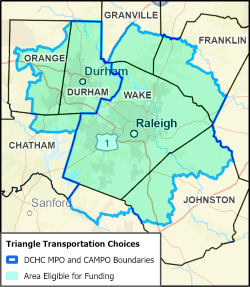CLOSED FY25-26 Request for Proposals (RFP)
Note: The RFP has now closed and applications are currently being processed.
The Triangle Transportation Choices transportation demand management (TDM) grant program is now requesting proposals for three different funding opportunities for a pilot 2-year RFP covering fiscal year 2024-25 (FY25) and fiscal year 2025-26 (FY26). It is the first time ever that the Program is offering grants for a two-year period of performance. A brief overview of these three different RFPs (traditional, innovative projects, and equity & inclusion pilot initiative) can be viewed here.
The application package (.zip) for each RFP can be downloaded directly via the links provided below. To ensure all links work within the application package, please remember to extract all documents from the zip folder. We strongly recommend that interested applicants begin by reading the application guidance document included in each application package. Completed applications, including all required submission documents, must be uploaded and submitted online using the links below by 5:00pm EST on Monday, February 12, 2024, to be considered for funding.
If you face any issues downloading an application package, submitting an application online, or have any questions regarding any of the RFPs, please contact Zachary Lang, Grant Administrator at zlang@centralpinesnc.gov.
Traditional RFP | Innovative RFP | Equity & Inclusion RFP |
|
About the Program
Encouraging individuals to use existing transportation infrastructure more efficiently by using alternative transportation methods can be one of the most cost-effective mobility investments that an entity can partake in. These alternative transportation methods include carpooling, vanpooling, taking transit, telecommuting, walking, and biking. 
The Triangle Transportation Choices program, a Transportation Demand Management (TDM) program, is a marketing and outreach effort that helps to promote alternative transportation in parts or all of seven counties in the Triangle region of central North Carolina: Wake, Durham, Orange, Chatham, Franklin, Johnston, and Granville.
Through the program, Central Pines hopes to reduce commuter reliance on single-occupancy vehicles and help encourage residents to be healthier and more sustainable. Our organization has served as the Program administrator since its beginning in 2008.
Connecting the Dots
The program seamlessly links NC state policy and funding with local and regional service providers, while drawing from the Metropolitan Transportation Plan (MTP) developed jointly by CAMPO and DCHC MPO for the Triangle region and NCDOTs TDM Strategic Plan to ensure statewide continuity.
Good For You, Good for the Community
The Annual Impact Report for the Triangle Transportation Choices program calculates emission impacts and societal benefits resulting from programs funded in that grant cycle by the Triangle Transportation Choices Program. Some highlights from fiscal year 2023 include 6 million vehicle trips being avoided and $34 million in savings due to societal benefits. For more information about the program please read our latest Annual Impact Report, Executive Summary, and Full Methodology.
Program Members
Learn about some of the efforts being made at each one of the Traditional Partner programs being funded by the Triangle Transportation program below.
Central Pines Regional Council | City of Raleigh | City of Durham | GoTriangle | Town of Chapel Hill | Town of Carrboro | Wake County | North Carolina State University | University of North Carolina Chapel Hill | North Carolina Central University | Duke University | Wake Technical Community College
Best Workplaces for Commuters (BWC) is a national recognition program, administered by the Center for Urban Transportation. Businesses and organizations that provide benefits, establish policy, and encourage their employees to use alternative modes of transportation (biking, carpool, transit, etc.) during their commutes can receive designation of this investment.
CPRC has administered the region's Best Workplaces for Commuters (BWC) Program since 2013, providing assistance to employers interested in adding commuter benefits or beginning the BWC application process.
Program Goals
- Decrease the number of single-occupancy vehicles at peak commuting times to decrease traffic congestion and greenhouse gas emissions.
- Assist employers in creating an alternative commute-friendly workplace.
- Support the region’s workforce by increasing employee access to flexible and sustainable commute options.
- Ensure BWC program membership is attainable for all businesses and organizations, regardless of their size, and increase membership opportunities for BIPOC and women-owned businesses.
Commute Friendly NC is a statewide recognition program that designates employers who actively maintain benefits, policy, and programs that incentivize their employees to take advantage of alternative commuting opportunities.
This program provides a simple and easy-to-use platform to recognize and celebrate the leadership of all those North Carolina businesses and organizations, who are taking valuable steps to shift single occupancy transportation trips to healthier, greener, zero to low-cost, and sustainable commute alternatives such as vanpool, carpool, transit, telework, biking, walking and flex work week.